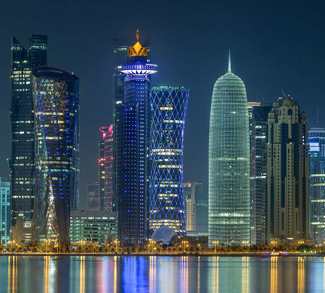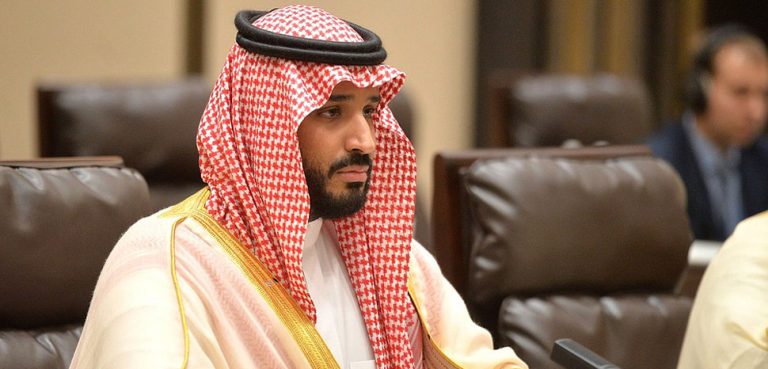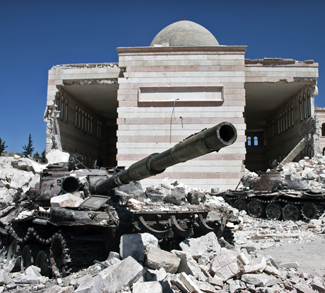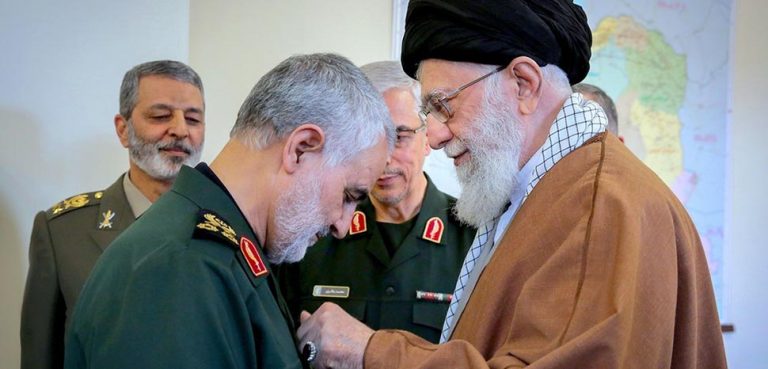Summary
An alliance of Arab countries led by Saudi Arabia has singled out Qatar in a row over state-sponsored Islamic extremism, and its nuanced relations with Iran. In an unprecedented move on June 5, Saudi Arabia, the United Arab Emirates, Egypt, and Bahrain severed all diplomatic ties and transportation links with the small Persian Gulf state, creating a chain reaction throughout the region. The diplomatic freeze-off is both punitive and coercive in nature. In addition to dismissing Qatari diplomats from their countries, Qatari nationals were given two weeks to leave before air, sea, and land links were closed off.
The Saudi blockade has had a significant impact on food, fuel, and flights in the region. Qatar’s political falling out with states that supply almost 80% of its food supply has predictably spooked residents and led to the clearing out of supermarket shelves in Doha. Moreover, the Qatari stock market fell 7% on the day after the initial announcement.
The blockade has resulted in rapid economic dislocation, the type that could lead to social and political unrest in Qatar. Families of mixed Gulf nationalities have been threatened with separation, while others have lost their jobs or positions at schools—some even barred from visiting family members who have fallen ill. 700 complaints were filed to Qatar’s Nations Human Rights Committee (NHRC) in the past week alone, and over hundreds continue to roll in with each passing day.
How did the region reach this tipping point?
Background
The Gulf’s problem child. Tensions between Qatar and its neighbors date back to when Sheikh Hamad bin Khalifa al-Thani ousted his own pro-Saudi father in a bloodless palace coup in 1995. Sheikh Hamad had always advocated an independent foreign policy—most notably diverging from that of Saudi Arabia by embracing Iran in oil dealings and seeking to restore relations with Iraq. Historically, Qatar had been considered “a kind of Saudi vassal state,” but the new Emir believed that Qatar could only find security by carving out an independent role for itself in the region. This began with the cultivation of gas wealth vis-à-vis the shared South Pars/North Dome Gas-Condensate field with Iran. Riyadh subsequently became implicated in two failed counter-coup attempts designed to re-instate the deposed Emir Sheikh Khalifa bin Hamad al-Thani. While Qatar had long been an exasperating neighbor, the arrival of its young Emir made it an outright challenger to Saudi hegemony in the region.
Qatar’s growing ambitions and failure to acquiesce to the regional order resulted in many clashes with its neighbors. In particular, Qatar’s projection of soft power and support for regional Islamists vis-à-vis the satellite news channel Al Jazeera incited a period of intense friction with other governments. In 2002, Saudi Arabia withdrew its ambassador from Doha for five years due to disagreements over the TV network’s coverage of domestic affairs within the kingdom. Moreover, not long after diplomatic relations were re-established in 2008, the ideological battle picked up once again when the Arab Spring erupted.
Al Jazeera is often blamed for inciting uprisings and challenging secular autocrats and unaccountable royals alike. As Kristian Coates Ulrichsen writes, “Qatar’s political stability, economic wealth, ties to the Muslim Brotherhood, and international reputation as a mediator gave it the confidence to take an interventionist role during the Arab Spring.” Still, Al Jazeera’s Arabic service is sometimes seen as a propaganda outlet for Sunni Islamists. Moreover, Egypt and Libya became a battleground for regional influence of the Muslim Brotherhood during this period. Doha and Abu Dhabi also found themselves increasingly at odds with each other, as reports emerged that the Brotherhood’s (outlawed) UAE-affiliate, Al-Islah, was given safe haven in Qatar in 2012.
When Emir Hamad handed power to his 33-year old son, Emir Tamim bin Hamad al-Thani, in 2013, Riyadh and Abu Dhabi had high hopes for a rapprochement with Doha. However, five months into Tamim’s rule, US media reported Muslim Brotherhood members regrouping in the Qatari capital in the aftermath of Egypt’s military coup. In light of this, Emirati and Saudi policymakers adopted a harsher stance by designating the Muslim Brotherhood a terrorist organization in 2014, a stance that’s well in-line with el-Sisi’s military regime in Egypt.
Gulf News indicated that King Abdullah had issued an ultimatum to Emir Tamim in November, 2013 to “change Qatar’s ways and bring the country in line with the rest of the GCC with regards to regional issues” (that is, quelling the Arab Spring). Further, prompting him to sign an additional security agreement agreeing to the principle of “non-interference’” in domestic affairs of other Gulf States – an agreement Qatar has failed to comply with. The crisis peaked in March 2014 when Saudi Arabia, UAE, and Bahrain withdrew their ambassadors from Doha in the name of “security and stability.” The dispute ended nine months later, after a series of Qatari concessions. Still, the ideological backlash against the movement lingers among royal families.
The current crisis revolves around a prisoner swap negotiated in April to release 26 members of a Qatari hunting party, including several members of Qatar’s ruling family. They had been taken hostage in southern Iraq in December 2015 by the Shia militia, Kita’ib Hezbollah, with links to Iran. Moreover, Qatar reportedly negotiated with Iran, Hezbollah, and the Syrian rebel group Jabhat al-Nusra to secure their release for a ransom up to $1 billion. Thus, ingraining its title as a “state-sponsor of terrorism.”
Regional rivalries fueling conflict in the Middle East. Qatar’s aspirations to step out of Saudi Arabia’s shadow and gain regional influence has led to both explicit and covert alliances with Iran, Hezbollah, and the Muslim Brotherhood. While its regional influence is often derived from the reach of these groups, their persecution has also resulted in Qatar’s isolation. Riyadh and Abu Dhabi have long been frustrated over Qatar’s independent and activist foreign policy, which digs into its vast coffers to project influence both far and wide, often cultivating relations with countries and organizations that are at odds with each other.
Nearly every crisis that the GCC has encountered has involved Qatar in some way or another. However, regional divisions can no longer be explained by a simple dichotomy between the Sunni Arab-bloc led by Saudi Arabia and Shiite Iran. As Hassan Hassan, a senior fellow at the Tahrir Institute for Middle East Policy, explains: “The countries of the region can be divided into two camps: one that seeks to advance its foreign interests through support of Islamists, and one whose foreign policy is guided by opposition to the rise of Islamists.” Qatar falls in the former camp, while Saudi Arabia and the UAE are in the latter.
This phenomenon has manifested itself in the plethora of proxy conflicts that have sprung in the wake of the Arab Spring. Most notably, Qatar has actively supported Islamist fighters in rebellions in Syria and Libya. In the Syrian civil war, Qatar-backed Islamist rebels are fighting against the Iranian-allied government of Bashar al-Assad. In the Libyan civil war, it found itself opposite the UAE after the fall of Muammar Gaddafi, supporting the Islamist-led government in Tripoli, while the Emiratis backed the leadership in eastern Libya. (Abu Dhabi has invested considerable resources in countering the rise of the Muslim Brotherhood, particularly in Egypt and Libya). Meanwhile, Qatar has also participated in a Saudi-led coalition fighting against Iran-backed Houthi rebels in the Yemeni Civil War. However, the Qataris are now being accused of supporting Houthi rebels via the sabotage of recent Saudi-led negotiations.
Within the power vacuum left by the Arab Spring, Qatar saw its influence grow rapidly. The small country used its disproportionate sway to negotiate with groups like the Taliban; it attempted to broker ceasefires between Israel and Hamas; and it extended considerable economic support to the Gaza strip. As a result of the Syrian civil war, the former leader of Hamas, Khaled Meshaal, was forced to leave Damascus for Doha. Although Iran was once Hamas’ biggest patron, relations soured when the Palestinians backed the uprising against Assad’s regime in Syria. For a period, Meshaal tried to form closer ties with the Gulf States, even meeting King Salman at one point. Now, however, Saudi Arabia and its allies are demanding that Qatar ends relations with Hamas and expel its leaders from Doha. Qatar could have acquiesced and expelled the Hamas leadership from Doha, but instead it has continued to host the organization.
Qatar has been charged with destabilizing the region with its support for extremist groups, but Doha has thus far rejected these claims as “misinformation,” instead pointing to its role as a “mediator.” Qatari Foreign Minister Mohammed bin Abdulrahman al-Thani contends that the state fell victim to a cyber attack that produced statements appearing on its state news-agency site on May 24 apparently praising Iran and Hezbollah, whilst criticizing its neighbors and President Trump.
The ‘Trump Effect.’ Trump’s first overseas visit to Saudi Arabia in May opened a new chapter in a multiyear saga of turbulent relations between Qatar and its neighbors. Many analysts believe that Trump’s unequivocal backing of Saudi Arabia has emboldened the state to reassert its leadership in the region and aggressively move to counteract Iranian influence. However, this power play not only brews regional instability, but also hurts US efforts to build a broader coalition against ISIS. Qatar has deep pockets and is unafraid to seek out new alliances. Most notably, Turkey has stepped up its support for Qatar, fast-tracking a bill to allow the deployment of troops to a Turkish military base in Qatar. Meanwhile, Iran has also rushed to establish an air bridge to Doha to fly shipments of food into Qatar, with plans to continue sending 100 tons of fresh fruit and legumes every day.
The Saudi-led alliance against Qatar has failed to gain traction, as it has been hampered by what James Dorsey, a Gulf specialist and senior fellow at Nanyang Technological University in Singapore, describes as “the bad optics of blocking the flow of food and medicine, the hardship imposed on individuals.” Observers have raised concerns over the humanitarian costs associated with the blockade, as Qatar emerges “as an underdog putting up a fight against what many may see as bullying.” About 80% of Qatari residents are foreign workers (white-collar professionals and construction service workers alike), which is why Qatar has not called for its citizens to leave as Saudi Arabia did.
While Trump’s rhetoric takes credit and praises the Saudi-led bloc’s decision to double down on Qatar, senior officials in his cabinet, including Secretary of State Rex Tillerson are trying to signal more long-term support. The four Gulf Arab monarchies at the heart of the dispute are US allies, and Qatar hosts the regional headquarters for US Central Command in al Udeid, an important base targeting the Islamic State. Despite recent events, the two have proceeded with conducting joint military exercises a day after agreeing to a $12 billion weapons deal, with Qatar buying as many as 36 F-15 jets from the U.S.
If denied U.S. support, Qatar will have no option but to back down; yet, mixed messages sent by the U.S. could be prolonging the crisis. In the meantime, countries that have offered to mediate include: the U.S., Kuwait, Pakistan, Russia, Turkey, Morocco, France and Guinea. Moreover, Iran’s Foreign Minister Mohammed Javad Zari has stressed that “coercion is never the solution. Dialogue is imperative.” However, the many competing interests and agendas will make it difficult to reach a settlement anytime soon.
Qatar is a key energy partner for Russia and China, one that not only has significant financial reserves, but also the support of the Turkish government and, increasingly, Iran. Thus, isolating Qatar will be no easy feat.




